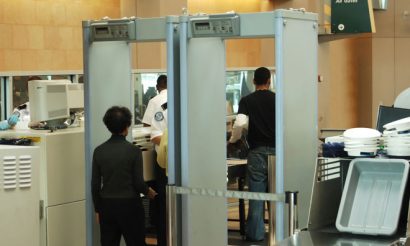Security since 9/11: How have changes affected passenger experience? Part 2
- Like
- Digg
- Del
- Tumblr
- VKontakte
- Buffer
- Love This
- Odnoklassniki
- Meneame
- Blogger
- Amazon
- Yahoo Mail
- Gmail
- AOL
- Newsvine
- HackerNews
- Evernote
- MySpace
- Mail.ru
- Viadeo
- Line
- Comments
- Yummly
- SMS
- Viber
- Telegram
- Subscribe
- Skype
- Facebook Messenger
- Kakao
- LiveJournal
- Yammer
- Edgar
- Fintel
- Mix
- Instapaper
- Copy Link
Posted: 6 September 2016 | Steve Wood (Leeds Beckett University) | 1 comment
In part two of the report on terrorism and security changes, Steve Wood will discuss why it takes young people longer to get past airport security in light of a survey conducted of university students aged 16-25 at Leeds Beckett University. You can read the first part here.


Terrorism, radicalisation and universities
The recent Counter Terrorism and Security Act 2015 imposes duties on universities to prevent terrorism and radicalisation. It also strengthens security arrangements in relation to the border and to aviation. Universities are clearly seen as a concern by the government and many terrorists have indeed attended a UK university.
University students aged 16-25 were the focus of the survey with the aim of discovering whether it takes them longer to travel through security at UK airports, and if so why. 711 students from Leeds Beckett University took part in this research over a period of four years from 2011 to 2014. The respondents used a variety of airports throughout the UK but over 50% of their experiences were documented as journeys from Manchester International and Leeds Bradford Airports. Respondents were allowed to voice reflections on more than one flight and as a result more than 3,000 security experiences were collected. The 711 respondents included 433 females and 266 males and around 40% were non-white British nationals. 93% of the 711 respondents were between the ages of 18-25.
More than 50% of these respondents claimed that on average it had taken them between 10 and 20 minutes to go through airport security and importantly more than 50% expected it would take them between 10 and 20 minutes to go through security. So the majority of respondents in the research were overall satisfied with the current level of security and the time it had taken them to go through security. This may be because they are of an age at which they habituated to high levels of security and safety at airports growing up in a security era dominated by the threat of terrorism. Nevertheless, we can take into account data from the Civil Aviation Authority (CAA) which corroborates the data from this survey supporting the idea that younger passengers do actually take longer to go through airport security at UK airports.
Nearly 37% of the student respondents disagreed with rules on the confiscation of liquids, including perfumes.
The CAA has been assessing passenger experience at five airports through the UK since 2008. Part of that process has been to ask passengers about their security experience. Since 2008 the CAA respondent average perceived queuing time going through security has gradually increased, with the exception of Gatwick Airport, and levelled out to 7.1 minutes in 2013 and to 7.0 minutes in 2014.


The CAA polled a wide age range of respondents however the age profile at Stansted Airport remains generally relatively young, with 50% of the respondents in 2014 aged between 16-34 years. Stansted has consistently returned higher waiting times than any other of the five airports used in the CAA data collection. In 2014, Stansted returned an average waiting time of 10.1 minutes suggesting that when measured against the CAA’s other data younger passengers were taking longer to go through security.
The question is: why do younger passengers take longer to go through security at UK airports?
More than 50% of respondents claimed that on average it had taken them between 10 and 20 minutes to go through airport security and importantly more than 50% expected it would take them between 10 and 20 minutes to go through security.
The evidence from the student survey data demonstrated that rather than the case being that the student respondents had been treated more suspiciously because their age is similar to the terrorists who in the past have carried out attacks, instead the reason for which younger passengers took longer on average was more likely attributed to their disregard and objection to security rules.
Ignorant youth?
Nearly 37% of the student respondents disagreed with rules on the confiscation of liquids, including perfumes. Another factor that could have attributed to an increased time for these passengers to go through security was that nearly 27% of the respondents when asked about general rules on security measures answered incorrectly and yet crucially, 93% claimed to know the standard security requirements.
Another matter for consideration is the proportion of females in the student survey and the high level of liquids that was confiscated. Females made up 62% of the respondents in this survey and liquids were the most frequent item to be confiscated (this included perfumes in excess of 100ml). This might indicate that young female passengers may take longer to go through security than males.
If airports can identify and profile those passengers who are likely to contribute to the overall delays through airport security then there is a possibility of engaging these passengers prior to the security process and reducing the overall waiting time.
Another factor that could have attributed to a greater time for these passengers going through security was that nearly 27% of the respondents when asked about general rules on security measures answered incorrectly and yet 93% claimed to know the standard security requirements.
There appear to be two issues – the lack of knowledge and an inherent disregard even when the knowledge is plainly provided. Airports have already made significant improvements to the preparation of passengers for security through signage prior to them being screened .
Can this be further improved?
If there is resistance towards the rules on liquids by younger passengers it is time to consider more provocative signage such as ‘prepare for security or be prepared for delays’ or greater focus on the signage surrounding liquids. Free clear plastic bags have been available for some time at UK airports however there are still a number of passengers overfilling these bags with multiple products of less than 100ml or trying to use two plastic bags.
There will always be incidents that require security to implement additional security measures immediately, such as in 2014 when certain airports were requiring large electrical gadgets such as laptops to be powered up before they would be accepted. If however airport operators can attempt to gain an in-depth understanding of the characteristics of their passengers be it with respect to security, be it their purchasing habits, then the better they will be able to target policies and resources in a far more cost effective way.
Related topics
Passenger experience and seamless travel, Security, Terrorist attacks



















A very good article and you hit the nail on the head. The younger people do not care for any rules even here in the USA. I have no idea how these young kids started this new trend of not obeying the rules.
Back in the old days a leather belt would solve most problems in my house
Cheers